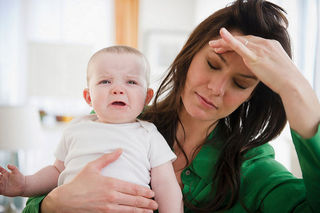Burnout
How to Cope With Parental Burnout
New research seeks to understand the causes of burnout among parents.
Posted August 28, 2018

Every parent can relate to the feeling of being on the brink of exhaustion or the edge of defeat. But what is it that allows some parents to ride out the sleepless nights, incessant nagging, and seemingly never-ending caregiving better than others?
New research published in Frontiers in Psychology examines the antecedents of parental burnout. It also offers practical advice to parents about how they can avoid burnout.
Parental burnout is defined as a "unique and context-specific syndrome resulting from enduring exposure to chronic parenting stress." Its primary symptom is overwhelming exhaustion relating to one's role as a parent. Other symptoms include:
- Emotionally distancing from children
- Feeling fed up with parenting
- Losing one's sense of accomplishment from parenting
And it's more common than you may think. According to prior studies, approximately 8-36 percent of parents suffer from parental burnout.
In this study, researchers from the Université Catholique de Louvain in Belgium theorized that parental burnout could be attributed to an imbalance between parental risks and protection factors. In other words, when risk factors begin to outweigh protections, parents are more prone to burnout.
To test their theory, the researchers recruited 923 French-speaking parents to participate in an online survey. First, these parents completed the Parental Burnout Inventory (PBI). The PBI measures one's self-reported level of parental burnout by asking 22 agree/disagree questions, such as:
- "I feel emotionally drained by my parental role"
- "I sometimes feel as though I am taking care of my children on autopilot"
- "I accomplish many worthwhile things as a parent"
Then, researchers asked participants to fill out another series of 39 agree/disagree questions measuring one's self-reported balance between risks and resources. Here are some examples:
- "I can easily reconcile my family life and my professional life"
- "Despite my parental responsibilities, I easily manage to find time for myself"
- "I am quite relaxed by nature"
- "I feel that I have the competences to be a good parent (e.g. I can get my children to obey me, I know how to help them do well at school, I know how to play with them)"
- "As a parent, I have high standards (I try to be a perfect parent, I put myself under a lot pressure and/or I am afraid of how others see me)"
- "I don’t share good times with my children (I don’t enjoy playing with them and/or they do not like the activities I suggest)"
- "I never take time to talk with my children (so they can tell me about their day, find solutions to their problems or exchange ideas and points of view)"
The researchers then compared PBI scores to one's self-reported balance between risks and resources. They found a strong relationship between the two inventories: parents who were more prone to risks versus resources were more likely to experience parental burnout, as measured by the PBI. Moreover, this effect did not depend on sociodemographics; the relationship was similar for all types of parents (male, female, age, race, income, etc.).
What does this mean for parents looking to reduce their risk of parental burnout? The researchers suggest a simultaneous approach of increasing resources and reducing risk factors. For instance, if parental chores are weighing you down, consider the help of a nursery. Or, if parental recommendations (for example, five fruits and vegetables per day, no television before age six, warm and positive parenting) are doing more harm than good, consider relaxing your notion of what it means to be a good parent.
Per their advice, identify your biggest caregiving stressors and take steps to build resources to help you make it through.
References
Mikolajczak, M., & Roskam, I. (2018). A theoretical and clinical framework for parental burnout: The Balance between Risks and Resources (BR²). Frontiers in Psychology, 9, 886.


